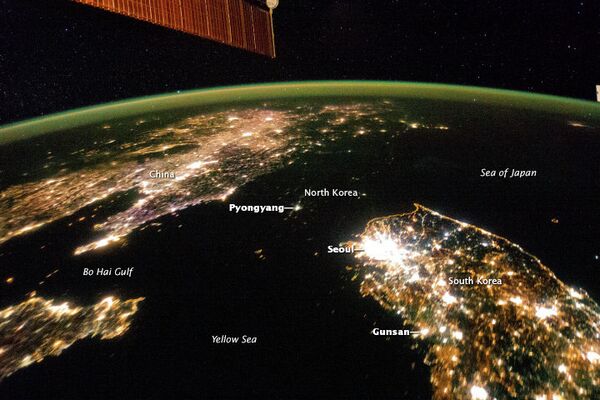MOSCOW, Ocotber 24 (RIA Novosti) - Economic growth in South Korea in the third quarter accelerated to 0.9% compared to 0.5% growth in Q2, slowing down, however, in a yearly estimate, to 3.2% as economic data are mixed and while some sectors are doing well, key spheres like exports and corporate spending remain weak.
The economy of South Korea grew faster in Q3 as consumer demand and the construction sector have shown stronger data than in the previous quarter, as evidenced by a Bank of Korea statement published Friday, Bloomberg reports. However, volume of exports decreased slightly as the global economy cools and international demand weakens. As a result, President Park Geun Hye’s administration is experiencing increased pressure for further expansion of the currently intact monetary and fiscal stimulus.
"South Korea is doing relatively well compared to other countries but growth is not yet firm,” Bank of Korea Governor Lee Ju-yeol said, as quoted by Reuters.
The consumer market expanded 1.1% in Q3 compared to Q2 data. Construction investment rose 2.9% from 0.4% last quarter. However, capital investment fell by 0.8% compared to 1.1% growth in Q2. Industrial investment decreased by 0.8% and exports shrank 2.6% mainly due to China’s economic downturn. Foreign sales of liquid-crystal displays and chemicals have shown the worst results in Q3. Industrial investment, particularly, in production equipment, is also declining due to the situation in oversea markets.
In response to the negative impact of the global market on the nation’s economy, Park’s administration has increased government spending by 2.2% and has taken legislative action in regard to the real estate market, easing the regulations in order to spur demand. The Bank of Korea has cut interest rates twice during the last two months to 2.0% now. The possible risk of a consequent acceleration of inflation is not a concern as consumer prices have grown only 1.1% this year. All these measures, which will cost the nation $29bn this year only, are expected to contribute to faster economy expansion.
“Policymakers may have to come up with more fiscal and monetary pushes,” said Yoon Yeo Sam of Daewoo Securities, as quoted by Bloomberg.
Economic growth in South Korea suffered a major blow in April when a ferry sank causing hundreds of casualties and undermining the nation’s travel industry. Analysts say that the anticipated positive effects of the government stimulus will not show until the end of Q4 or early next year, Reuters reports, as monetary and fiscal easing takes time to stimulate the non-financial sector.


